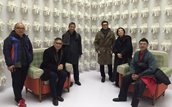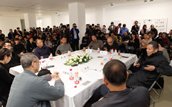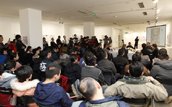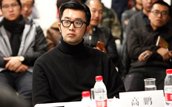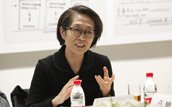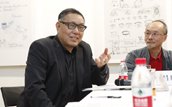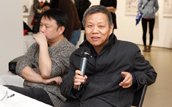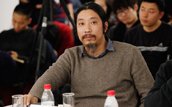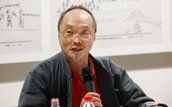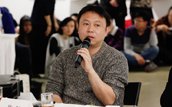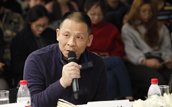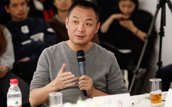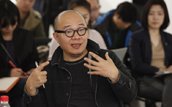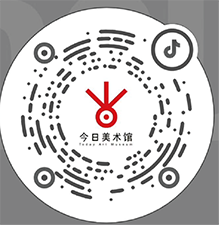Location: 4/F,Building No.1
Last century: popularity and modern experience (scene 1)
Back
Duration: 2015-12-05
--
2015-12-05
Location: 4/F,Building No.1
Location: 4/F,Building No.1
Seminar Introduction
On the afternoon of December 5th, solstice, 2015, the theme seminar of "the last century" was successfully held in the fourth floor of hall 1 of today art museum. This series of seminars was hosted by wu hong, professor of art university of Chicago, and hosted by today art museum.
5 in the afternoon, the first theme popular and modern experience shall be presided over by shu wen, the guests take part in the seminar, today art museum curator cao peng, a professor at the university of Chicago art WuHong, central academy of fine arts professor lu shengzhong, China academy of art ming-xian wang, a professor in the school of architecture, contemporary artists sequence, artists, curators nen, researchers BaoDong, central academy of fine arts professor Lin Yilin and curators Su Lei. The participants discussed in depth the different concepts of "people" and "folk" in art and aesthetics in specific historical periods when they were placed in different contexts from different identities and perspectives. As a political aesthetic color, the people's nature, its inherent complexity and multi-level in the context of today's society is worth to be discussed and extended, it may be the emergence of new people in this era must rely on the background of civilization.
First, gao peng, director of today art museum, will give a brief guest introduction and opening remarks. Immediately, the host of this seminar, shu kewen, discussed the arguments of the seminar and why the popularity and modern experience were discussed. She pointed out that the seminar did not directly discuss teacher lu's works, but it was an extension of some problems that teacher lu came into contact with in his work. The topic of Mr. Lu's exhibition in today art museum is the last century, why the last century is chosen as the topic is worth discussing. At the same time, she sorted out the concept of people's nature in time and history: for Chinese people, no matter they are people or people or people, this political dimension has never really been interrupted in history, and the concept of people has retained its traces in history in different forms. It is worth discussing whether political aesthetics, which appeared in the form of political theology in the last century, can connect with or further promote or negate the Chinese tradition of the people's foundation.
Professor wu hong has been paying close attention to and discussing the topic of popular nature and modern experience. WuHong professor from a traditional Confucian concept of "people", respectively, from the perspective of sociology, political science and literature of the concept of modern transformation process are summarized, and he talked about three books can be fully explains the concept: "people first", "imagine the people", "the crowd psychology", from people's autonomy to the people's common prosperity, he thinks the masses how to discuss how the word as a modern concept, is important for preparation of revolutionary politics in the 20th century. In the early 20th century, the translation of Marie le pen's "mass psychology" into Chinese also had an impact on the world. In the 20th century, it was the emergence of mass demonstrations and people's strikes. Mass emotion is a form of deindividuation. In mass psychology, Marie le pen said that "the era we are going to enter is essentially the era of crowds. This sentence in the last world has been given a sense of a prophet. He also suggested that young people must read chairman MAO's speech at the yan 'an forum on literature and art in 1942. If young people have not seen the speech, they must read it.
Wang mingxian pointed out that for 30 years, lv shengzhong insisted on the folk art as the creation form of modern art and now it is very important to become experimental art. He talked about the relationship between space production and cultural production and the nature of the people. At the same time, he pointed out that what Mr. Wu hong said about MAO zedong's speech at the yan 'an forum on literature and art was of great importance today as a policy of Chinese art.
Curators bao dong first from the people, he believes that the people is a political discourse, lu teacher's creation is more folk nature. What he is concerned about is the way teacher lu works in the context of today's China which is always associated with vernacular vocabulary. The earliest concept is lu xun's local literature. BaoDong to make the artist lu shengzhong and feng-yi guo very good comparison, BaoDong think they intended to make good use of the folk resources, is not a member of the folk, but stand in the Angle of the intellectuals, the Angle of the elite is one of the elite to the folk, folk is the foundation of all society, at the same time, farmers in today's increasingly extensive vocabulary: kill prick silk, matt, for example, he thought the feng-yi guo lu shengzhong and teacher resource utilization of the difference between modernity they are alternative modernity and modernity, is worth exploring.
Lu shengzhong said that he came into contact with folk art when he was photographed by the ministry of culture creating a piece of folk art in shandong province. He admitted that he took the initiative to pay attention to local culture and folk art at that time. The greatest desire at that time was to break away from the countryside. When I went to college, I just felt that learning the art in the mainstream was a supreme thing. Influenced and dyed by culture since childhood, I began to oppose traditional things in the 1980s. I felt that I had found a cultural link between folk culture and contemporary art. This bond made him the creator of contemporary art. This belief is his attitude towards creation.
Su lei, curator of future exhibitions at today art museum, discusses his views on cultural patterns. He believed that in the historical process, the cultural pattern experienced from the attitude to the form, to the relationship to the form, and predicted that the future will develop into the logic to become the form of the pattern.
Lin yilin believes that the concept of people is very important to Chinese people. He said his name had something to do with it. He talked about the disappearance and transformation of the farmer's image created by lv shengzhong after the 1980s. Began to replace the word with folk, he spoke of very important oil painting nationalization issue, the people as the object of art form of the carrier, success may be oil painting nationalization zao, luo zhongli work, disappeared with the people as a kind of content and form, so the title of the last century's utopia homesickness and spirit loss of supply to the modernization of China.
Artist wang Yin talks about shandong's mo yan teacher, "" northeast township" "has become the concept of hometown under the open modern vision of literature. Hometown, he thought, was something that existed only after leaving. In his opinion, Mr. Lu's works are folk and correspond to the New Year's painting movement in the 1950s. His works are simplified images.
Ou ning talked about the peasants becoming the representatives of magazine covers and the people becoming the masters of the country. The people established their political legitimacy through media politics. In the last century, it was found that the people became the subjects, but it has not been implemented. He believed that the people become the subject of history to get their own voice judgment is the real subject. Class exists in all ages, but there is no class consciousness. Differentiation is the objective reality, and how you attribute yourself to it does not exist. It is important to respect the existence of class and draw on class consciousness and try to establish new subjectivity. He talked about Tolstoy's "class transvestism" is to take the initiative to erase the difference with the peasant class, reasonable construction of subjectivity, showing that Tolstoy has no class attitude. Can stimulate the community art practice mutually.
"I have no right to say that I only make art for myself," Mr. Lu said at the end of the seminar. As an artist, he appreciates the art form of New Year paintings -- everyone has exhibitions at home, many practitioners, many viewers, after a time to tear, not eternal -- which he calls the "peach blossom land" of art. Today's topic is thought-provoking and has a lot of room for discussion. The host, shu kewen, said in the conclusion that lu's works and thoughts focus on the so-called study of the folk, the concept of the folk, the folk today is the aesthetic taste and style changes. The art is created in that way. It is involved in every family's life. The true popularity is not what style is selected. In today's standard model of capitalism, the space for civic initiative has been transformed, and the discussion opens up the question rather than drawing conclusions.
(source: phoenix art)
Guest
Ou Ning,Wu Hong,Wang Mingxian,Gaopeng,Shu Kewen,Lu Shengzhong
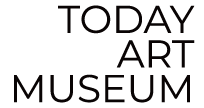
 Bologna Illustrators Exhibition 58th
Bologna Illustrators Exhibition 58th Zhiguan: Wang Zimu Art Exhibition
Zhiguan: Wang Zimu Art Exhibition Seasons of Cezanne The Immersive Experience
Seasons of Cezanne The Immersive Experience Marie de Villein: Behind the Sun
Marie de Villein: Behind the Sun “一粒一世界——北京大学颗粒艺术展”
“一粒一世界——北京大学颗粒艺术展”
 Florentijn Hofman :Celebrate!
Florentijn Hofman :Celebrate! Li Nu: As if Sand Were Stone
Li Nu: As if Sand Were Stone Exhibition customization course | TIM YIP MIRROR children's art class
Exhibition customization course | TIM YIP MIRROR children's art class
 TAM Open Studio / Hello, New Friends
TAM Open Studio / Hello, New Friends WANG SHIKUO/TODAY ART MUSEUM YOUNG ARTIST RESIDENCY IN NEW YORK CITY
WANG SHIKUO/TODAY ART MUSEUM YOUNG ARTIST RESIDENCY IN NEW YORK CITY 2018 third wang shikuo award -- nomination exhibition of contemporary young artists
2018 third wang shikuo award -- nomination exhibition of contemporary young artists

